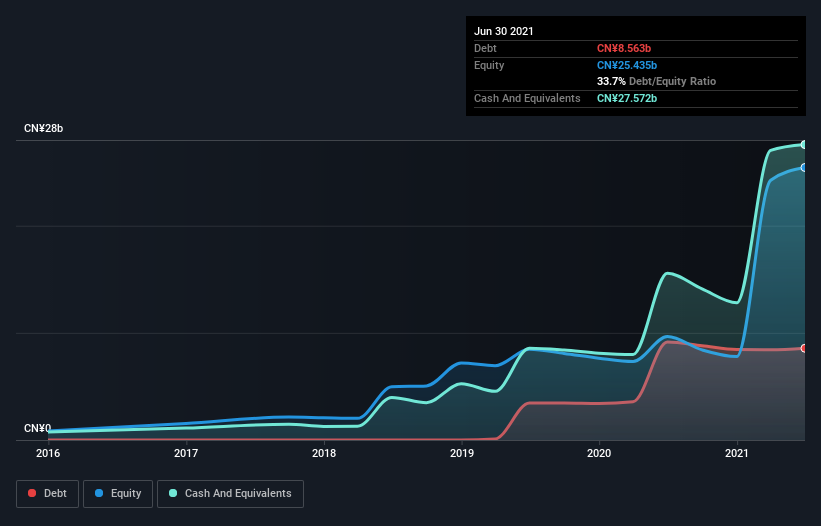Despite Lacking Profits Bilibili (NASDAQ:BILI) Seems To Be On Top Of Its Debt
The external fund manager backed by Berkshire Hathaway's Charlie Munger, Li Lu, makes no bones about it when he says 'The biggest investment risk is not the volatility of prices, but whether you will suffer a permanent loss of capital.' So it might be obvious that you need to consider debt, when you think about how risky any given stock is, because too much debt can sink a company. We note that Bilibili Inc. (NASDAQ:BILI) does have debt on its balance sheet. But the real question is whether this debt is making the company risky.
When Is Debt Dangerous?
Debt assists a business until the business has trouble paying it off, either with new capital or with free cash flow. Ultimately, if the company can't fulfill its legal obligations to repay debt, shareholders could walk away with nothing. However, a more common (but still painful) scenario is that it has to raise new equity capital at a low price, thus permanently diluting shareholders. Of course, plenty of companies use debt to fund growth, without any negative consequences. The first step when considering a company's debt levels is to consider its cash and debt together.
View our latest analysis for Bilibili
How Much Debt Does Bilibili Carry?
The image below, which you can click on for greater detail, shows that Bilibili had debt of CN¥8.56b at the end of June 2021, a reduction from CN¥9.14b over a year. But on the other hand it also has CN¥27.6b in cash, leading to a CN¥19.0b net cash position.
A Look At Bilibili's Liabilities
According to the last reported balance sheet, Bilibili had liabilities of CN¥9.40b due within 12 months, and liabilities of CN¥8.46b due beyond 12 months. On the other hand, it had cash of CN¥27.6b and CN¥1.38b worth of receivables due within a year. So it can boast CN¥11.1b more liquid assets than total liabilities.
This short term liquidity is a sign that Bilibili could probably pay off its debt with ease, as its balance sheet is far from stretched. Simply put, the fact that Bilibili has more cash than debt is arguably a good indication that it can manage its debt safely. When analysing debt levels, the balance sheet is the obvious place to start. But ultimately the future profitability of the business will decide if Bilibili can strengthen its balance sheet over time. So if you're focused on the future you can check out this free report showing analyst profit forecasts.
Over 12 months, Bilibili reported revenue of CN¥15b, which is a gain of 76%, although it did not report any earnings before interest and tax. Shareholders probably have their fingers crossed that it can grow its way to profits.
So How Risky Is Bilibili?
We have no doubt that loss making companies are, in general, riskier than profitable ones. And in the last year Bilibili had an earnings before interest and tax (EBIT) loss, truth be told. And over the same period it saw negative free cash outflow of CN¥1.5b and booked a CN¥3.9b accounting loss. But the saving grace is the CN¥19.0b on the balance sheet. That kitty means the company can keep spending for growth for at least two years, at current rates. With very solid revenue growth in the last year, Bilibili may be on a path to profitability. Pre-profit companies are often risky, but they can also offer great rewards. There's no doubt that we learn most about debt from the balance sheet. However, not all investment risk resides within the balance sheet - far from it. These risks can be hard to spot. Every company has them, and we've spotted 3 warning signs for Bilibili you should know about.
If, after all that, you're more interested in a fast growing company with a rock-solid balance sheet, then check out our list of net cash growth stocks without delay.
This article by Simply Wall St is general in nature. We provide commentary based on historical data and analyst forecasts only using an unbiased methodology and our articles are not intended to be financial advice. It does not constitute a recommendation to buy or sell any stock, and does not take account of your objectives, or your financial situation. We aim to bring you long-term focused analysis driven by fundamental data. Note that our analysis may not factor in the latest price-sensitive company announcements or qualitative material. Simply Wall St has no position in any stocks mentioned.
Have feedback on this article? Concerned about the content? Get in touch with us directly. Alternatively, email editorial-team (at) simplywallst.com.

 Yahoo Finance
Yahoo Finance 
